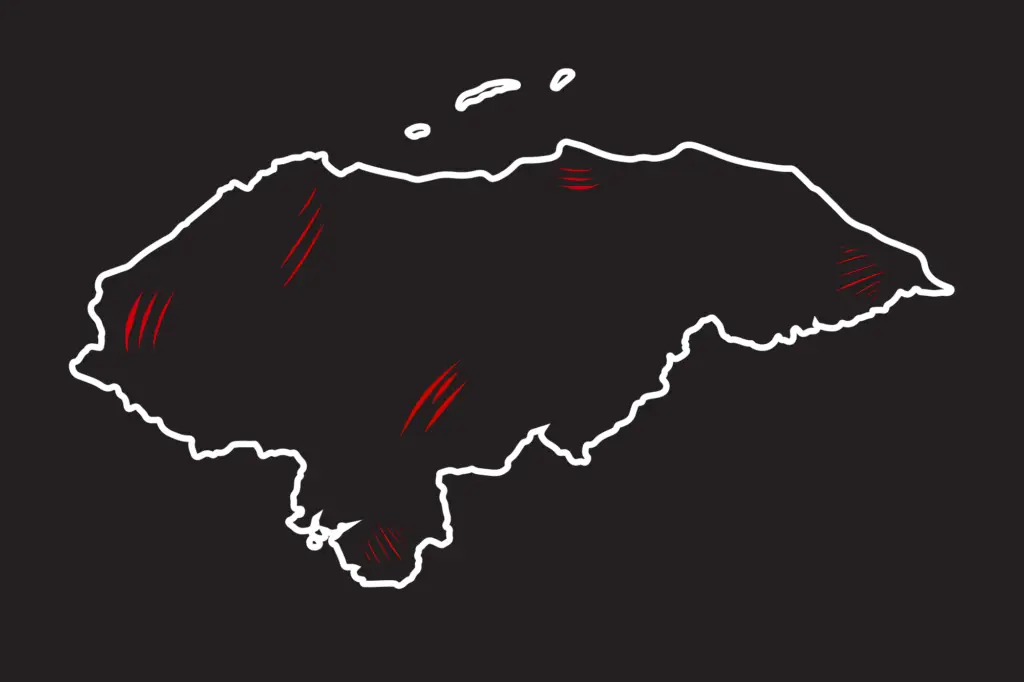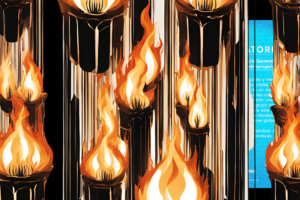By: Jennifer Avila
Illustration: Persy Cabrera
Translation: Amy Patricia Morales
Amilcar Alexander Ardón Soriano walked to the witness stand, beneath the solemn gaze of Judge Castel, presiding over the trial that is still an open wound within all Hondurans. A wound that cannot be explained, yet has fractured us, leading us to address—or rather, complicate—every issue with a relentless cycle of dispossession.
When the judge asked him to spell his name for the clerk’s record, Amilcar Alexander Ardón Soriano stumbled over the letters. Despite only having a fifth grade education, this did not stop him from building a small empire in a poor Honduran town, trafficking more than 200 tons of cocaine to the United States —an empire he regarded with admiration.
This self-confessed criminal was mayor of his town. He even said he gave a million dollars to the man who would later become president of the country the first time he decided to contribute to begin his political career. He rubbed elbows with him, as if they had been equals, that almost illiterate young man from a small town in Honduras with a lawyer who got his master’s degree in the United States. But they were never equals. Juan Orlando Hernández knows it, he looks down on him from his defendant chair— Hernandez in the suits and ties he wore when he was president, Ardón in an orange prison uniform. The perplexing question remains: why does a society that perpetuates class divides unites people in nefarious businesses that simultaneously perpetuate those same divisions?
On the witness stand, Ardon is bargaining for his freedom in exchange for all the information he has provided incriminating Honduran narco-politicians. But there, sitting in front of the jury and an audience of Honduran journalists and migrants, he wept when former President Hernandez’s defense attorney asked him when he had first killed someone. Ardón pleaded guilty to participating in 56 murders in Honduras. He said that the first time he killed someone was when he was 18 years old, a boy just like him, the same age, with the same background, as revenge for killing his brother. The defense lawyer asked him why he didn’t go to the authorities to denounce the crime instead of taking justice into his own hands, and many in the room crossed their eyes, as if the answer to that question was obvious: that’s how things are resolved in Honduras.
Between 2000 and 2024, there were around 103,000 homicides in Honduras, which placed us in the top of the most violent countries in the world without a declared war. A potent blend of inequality, poverty, and pervasive violence has forged a country from which thousands flee daily. When you factor in impunity and cocaine, the result is a narco-state where figures like Ardón, the Valle Valle clans, Urbina, Hernández, Rivera Maradiaga, and Zelaya amass power, utilizing state institutions for drug trafficking. In this society, disparities converge and intertwine, enabling a select few to escape misery while others, albeit a minority, perpetuate opulence, both at the expense of countless lives and futures. It’s a self-destructive cycle, a scenario akin to a dog chasing its own tail. The issue extends beyond politicians financing campaigns with proceeds from cocaine trafficking; they actively engage in authoritarian practices, consolidating both formal and informal power to manipulate the State—meant to protect and guarantee basic rights—into serving organized crime.
Why do you open and pave roads in Honduras, Ardon was asked during the trial. Revealing his life’s priorities, he answered: to improve the cocaine route and also to help the communities. In Honduras there are hundreds of roads that communities cannot use to market legal products that could improve their quality of life. These roads cutting through jungles were opened by drug traffickers and ranchers under the watchful eye and patience of those in power. Several of these roads were approved by local or national leaders so that the State does not regulate them and communities refrain from complaints. They are desolate paved roads, often cleared so that no one would pass by when a small plane had to land, or when the warlord of that territory would pass by with his vans, dump trucks and trucks full of cocaine.
The police operations mentioned in the trial were shown to work, however, solely for the purposes of guaranteeing the unobstructed passage of cocaine and prevention of theft by opposing cartels, not to protect people. The military helicopters, meanwhile, were used to transport the president to his meetings with drug traffickers or to kill indigenous people in the jungle, thus corroborating that the government was collaborating with the United States in its war against drug trafficking, something the United States celebrated at the time. Within the security institution, power was used to plan assassinations of members of competing cartels, or officials and advisors who denounced the narco-state. These killings, conducted in plain sight, have inflicted visible and invisible wounds on us, marked by named casualties like Alfredo Landaverde, Aristides Gonzalez, Marlene Banegas; and many others bearing the names of my cousin, your uncle, your nephew, our friends, someone’s children. Yet, the most profound wound bears the name Honduras, and its pain resonates deeply within us.
Honduras hasn’t experienced a war of its own. It has been entangled in the conflicts of the United States—be it the counterinsurgency in the eighties, battles against drug traffickers, or campaigns created to fight against them. In all of them, Honduras has been burdened with territorial losses, casualties, the mass exodus of people, and overflowing cemeteries. Despite this history, peace has remained elusive, both formally and informally. Talking about peace in Honduras inevitably involves assigning blame to someone else—another party, another team, another neighborhood. Any discussion on peace leads to inevitable disqualification and even aggression towards the “other,” who, in the end, is a reflection of ourselves.
These are the kind of wounds that fratricidal wars leave and that Honduran society is plagued wih. Perhaps the trials in New York are that, a process that helps us initiate peace dialogues, to create new social pacts, to reweave the social fabric and redirect the State, peace agreements that emerged from wars we have lived through, because of foreign intervention. That is a hopeful view. The other, less optimistic, would be to see a Honduras more polarized, desperately searching for simple answers, as we have been taught: “all politicians are the same”, “politics is dirty”, “everything is rotten”, “in Honduras there will never be justice”, “the iron fist finally solves”, “we have an autocrat”, “let’s sacrifice freedom for security”; and so on, deepening our wound.
The narco-state was consolidated in the midst of the polarization left by the coup d’état, backed by a history of violent divisions between traditional political parties, landowners and opportunistic politicians. A history of fratricidal confrontation that has only benefited the political elites who submerge themselves in power over and over again. Because while the population tears its eyes out plunging our world into blindness and chaos, drug traffickers and corrupt politicians maintain their reign and will continue to do so because they watch, from their privileged balconies, how the rest of us, torn apart by internal conflicts, destroy it by defending some and accusing others.
A peace accord in Honduran means reimagining what we as a society have created, that monstrous hunger for power and hatred. Reconciliation is not synonymous with forgiveness or the mass execution of those who are considered guilty; it is the collective exercise of seeking a way to reach the “never again” that allows us to break the cycle that feeds the narco-state: “as long as there is coca, there will be life”.






